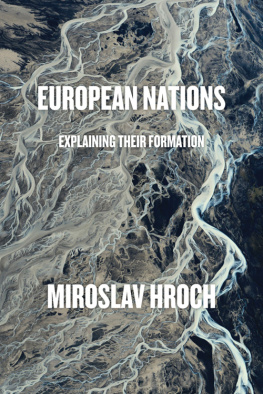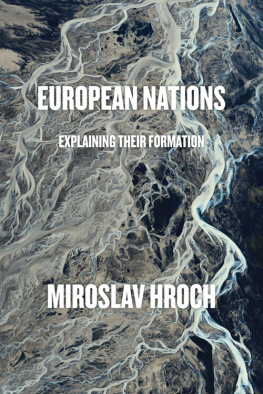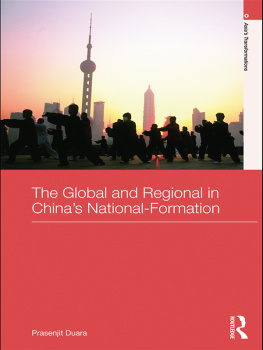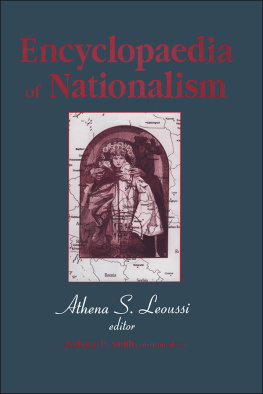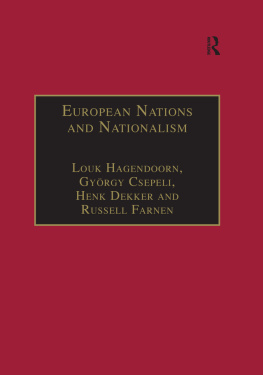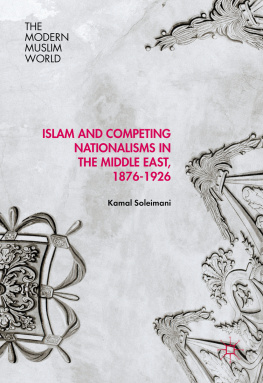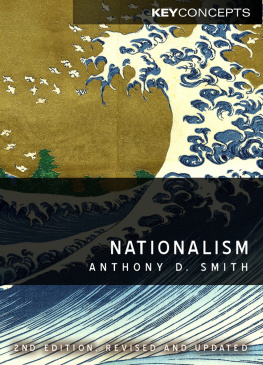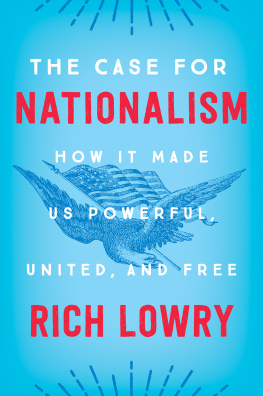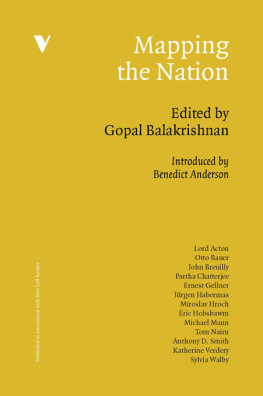EUROPEAN NATIONS
Explaining Their Formation
Miroslav Hroch
Translated by Karolina Graham


Translation of this book was supported by eskoslovensk obchodn banka as a part of the project Bibliotheca Economica
This English-language edition first published by Verso 2015
Translation Karolina Graham 2015
Previously published as Das Europa der Nationen
Vandenhoeck & Ruprecht 2005
All rights reserved
The moral rights of the author have been asserted
1 3 5 7 9 10 8 6 4 2
Verso
UK: 6 Meard Street, London W1F 0EG
US: 20 Jay Street, Suite 1010, Brooklyn, NY 11201
www.versobooks.com
Verso is the imprint of New Left Books
ISBN-13: 978-1-78168-834-2 (PB)
ISBN-13: 978-1-78168-833-5 (HC)
eISBN-13: 978-1-78168-835-9 (US)
eISBN-13: 978-1-78168-836-6 (UK)
British Library Cataloguing in Publication Data
A catalogue record for this book is available from the British Library
Library of Congress Cataloging-in-Publication Data
A catalog record for this book is available from the Library of Congress
Typeset in Minion by Hewer Text UK Ltd, Edinburgh, Scotland
Printed in the US by Maple Press
Contents
Anyone who has been keeping up-to-date with the world of academic publications, even from a distance, knows that nation and nationalism belong among the most frequently studied subject matters, and it is legitimate to question the point of adding another book on the topic. Ones scepticism would be all the more justified if the aim of this book were to present yet another new theory of nationalism. Any author who aspires to extend themselves beyond a mere description or narrative is, by definition, making an attempt to be original. Admittedly, such originality far too often rests either on taking one aspect of an issue out of context and blowing it out of proportion, or on presenting a new combination of already known theories and concepts. Several books, written in reaction to the sheer number and variety of publications to date, focus on a critical overview of older ideas.
This inundation of theories of nationalism signals a need to take a pause and capture the present situation in research to compile a synthesising work which focuses on those available findings that can be integrated into a coherent system. Therefore, rather than to highlight the (actual or seeming) originality of individual contributions, the aim here is to concentrate on approaches that facilitate a scholarly consensus. Once we disregard the frequently presented originality of new terms, we find that the differences among individual concepts are much less marked than many of their authors may wish us to think.
The issues that this synthesis addresses must be defined at the very outset. This is not intended as a summary concerning atemporal nationalism, nor the present-day shape and interests of European nations. It is about their genesis, and the focal point of the historians interest is thus the various paths that were followed in the nation-forming processes or, as some authors prefer to put it, the constructing of nations in Europe in the nineteenth century.
This type of synthesis could have been approached in two ways: by means of a narrative, or by focusing on particular factors. With the help of a narrative, one can capture the ways in which individual nations formed. Alternatively, based on ones knowledge about these nation-forming processes, an attempt can be made at discovering which elements and contexts proved decisive in these processes and, in so doing, lay foundations for a causal analysis. I have opted for the latter option: to favour generalising reflections over plain description. This is the only way in which it is possible to draw comparisons, the aim of which is to prepare material that will explain the causes of successful (or unsuccessful) modern nation-forming.
Any such approach should also contain nothing hidden the authors points of view ought to be defined, at least in general terms, at the very outset. I do not believe that a nation is merely a cultural construct, an invention that could be brought into existence by anyone, anywhere by spreading nationalistic slogans. It is even less likely that modern nations are the result of an abstract nationalism. The vision of a nation as one form of a modern civic society proved successful only in particular social, political and cultural circumstances, which came into play independently of the wishes and ideals of the nationalists. Due to the entirely divergent applications of the term nationalism, it is not only very difficult but actually impossible to provide a definition of the word that would achieve consensus. This is the reason why I doubt that this term can become a tool of critical analysis, and why I have made the decision not to use it in any other than its traditional sense with a negative connotation.
All of the above has determined the basic structure of this book. Without aiming to reconcile the conflict between the constructivists and the essentialists, I attempt to portray the historical development towards a nation sub specie of both these approaches. The opening part of the book presents an overview of the development of ideas about the nation and the causes of its formation. The second part offers a summary of those objective circumstances in which nation-forming originated, and whose part in this process is generally recognised, albeit with a varying emphasis: earlier historical developments, ethnicity, political and economic modernisation. These contexts and relationships among them will be addressed as a set of prerequisites without which the forming of any nation would be unthinkable. The third part of the book is dedicated to human (patriotic) activities that aimed to facilitate nation-forming. I will summarise and interpret the available research findings concerning the role of power struggles and other nationally relevant conflicts of interest, the making of history relevant to the national framework in the construct of national history, the linguistic and cultural demands made by the leaders of national communities, and the role of myths, symbols, celebrations and so on. However, these findings will at the same time be verified against what we know about the course of development of specific nations.
No claims of any kind are made that this book will resolve the issue of nation-forming. Although all chapters are units in their own right, it does not mean that I consider everything to have been answered or clarified. Indeed, it ought to be an aim of all syntheses not only to present a summary of all available findings and views, but also to open a future avenue, to become a springboard for further research. Attentive readers will, undoubtedly, spot the blank spots, gaps in knowledge and contradictions in the interpretations of causal relationships. While some of these are a reflection of the fact that certain data are lacking and some questions have yet to be researched, others may stem from my own limited knowledge.
This book is a historical work, which endeavours to avoid projecting current conflicts and myths into the past, evaluating the past through the eyes of the present, or engaging in the selection of data according to their political relevance. Such an approach would reinforce the tendency to view the matter through a false, politicised and ideologised lens. The fact that the twentieth century witnessed wars conducted in the name of the nation, ethnic cleansing, and nationalistically motivated mass murders should not prevent historians from being able to look clearly at the long historical period that preceded the outburst of these evils. We cannot simply draw single-track causal successions and look upon nineteenth-century nation-forming as a seed and a root cause of later crimes or even as a wrong turn that European society took. Certainly, the relationship between the past and the present cannot be disregarded. However, the main aim of this book is to make a contribution by presenting findings about nineteenth-century events and relationships in order to facilitate a better understanding of events that followed later. This is another reason why the use of the term nationalism has been avoided, as it conjures up the feeling of timelessness and, indirectly, ushers in the need for a judgemental, condemning or apologetic view of events that ought to be examined

